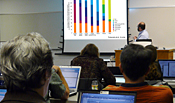You are here
Knowledge Transfer
 |
|
| CMOP has a robust and evolving set of knowledge transfer activities with the Scientific Community, Industry, Regional Interests, and Ocean Observing Systems. | |
CMOP is establishing itself as an intellectual magnet and resource for the ocean-sciences community and other communities that are shaping the next-generation of oceanography.
The center provides a structure in which industries work with researchers and educators, as opposed to just serving as vendors and contractors. We also lend our expertise and scientific information to support the efforts of federal, Tribal, state, and local agencies towards sustainable management of Pacific Northwest coastal margin resources.
CMOP is becoming a transformational partner in regional, national and international efforts towards ubiquitous ocean observing.
SCIENTIFIC COMMUNITY
RISE project
SATURN daily forecasts have become a common form for CMOP to support cruises of Pacific Northwest science projects including the NSF-supported RISE project. SATURN observations are also becoming integral infrastructure for the RISE project.
Several CMOP scientists participate intellectually in RISE, with manifestation in peer-reviewed publications.
EcoHAB project
SATURN daily forecasts have become a common form for CMOP to support cruises of Pacfic Northwest science projects including the NSF/NOAA-supported EcoHAB project.
Monterey Bay Aquarium Research Institute (MBARI)
The center has acquired an Environmental Sample Processor (ESP), and collaborating with Chris Scholin, of MBARI, in the customization of the microbial probes to be used with the ESP for Columbia River research.
Monterey Bay Aquarium Research Institute - Learn more
SELFE
CMOP investigators Y. Joseph Zhang and António Baptista led the development of ELCIRC and SELFE, unstructured-grid computer models for 3D simulation of circulation and transport in natural water bodies. An international users group convenes annually since 2004.
SELFE - Learn more
CALFED Bay-Delta Program
Antonio Baptista participated in the Scientific Advisory Board of the CALFED Bay-Delta Program through the termination of that board, in late 2008.
CALFED Bay-Delta Program - Learn more
University-National Oceanographic Laboratory System (UNOLS)
SWAP2 radio network for UNOLS vessels: OHSU and OSU staff has partnered to install and maintain SWAP2 around the mouth of the Columbia River and Yaquina Bay.
University-National Oceanographic Laboratory System - Learn more
INDUSTRY
Industry involvement in CMOP has evolved through collaborations. Particularly active efforts involve:
REGIONAL INTERESTS
Columbia River Treaty Review
Working under the guidance of the Sovereign Technical Team, a group of scientists from the United States Geological Survey (USGS), Corps and the NSF Science and Technology Center for Coal Margin Observation & Prediction (CMOP) are studying the impact of various Columbia River Treaty alternatives, coupled with climate change, on the estuarine habitat. The SATURN collaboratory supports this joint effort.
Columbia River Treaty Review - Learn more
NOAA, Northwest Fisheries Science Center
- Survival of juvenile salmon in the Columbia River plume.
CMOP investigators continue to collaborating with NOAA's Northwest Fisheries Science Center to determine how out-migrating juveniles of threatened and endangered salmon stocks are using the Columbia River plume as habitat.
NOAA, Northwest Fisheries Science Center - Learn more
- Salmon habitat in the Columbia River estuary.
CMOP investigators continue to collaborate with NOAA's Northwest Fisheries Science Center and the Portland District of the US Army Corps of Engineers to improve scientific understanding of salmon habitat needs and challenges in the Columbia River estuary.
Office of Naval Research
RIVET-II is an Office of Naval Research (ONR) research initiative directed at understanding processes in coastal inlets and rivers mouths, with geographic focus on the Columbia River mouth.
RIVET-II - Learn more
Oregon Department of Geology and Mineral Industries
Tsunami hazards. Y. Joseph Zhang continued to conduct collaborative research with state and federal agencies on computer simulations of tsunami inundation. SELFE is used as anchor technology (an adaptation of a CMOP technology). Media coverage has resulted from this collaboration.
Oregon Department of Geology and Mineral Industries - Learn more
Texas Water Development Board
Evaluation of ELCIRC and SELFE for Texas estuaries. Y. Joseph Zhang is collaborating with the Texas Water Development Board in a model inter-comparison for Texas estuaries, involving several unstructured grid models (including SELFE).
Texas Water Development Board - Learn more
US Army Corps of Engineers, Portland District
Salmon habitat in the Columbia River estuary
CMOP investigators continue to collaborate with NOAA's Northwest Fisheries Science Center and the Portland District of the US Army Corps of Engineers to improve scientific understanding of salmon habitat needs and challenges in the Columbia River estuary.
US Army Corps of Engineers, Portland District - Learn more
US Geological Survey (USGS)
SATURN-05 is a station at river mile 53 (commonly referred to as the Beaver Army Terminal site). The station serves as an important step forward in coupling USGS water quality time series projects with the CMOP collaborator activities.
United States Geological Survey - Learn more
CMOP is investigating the effects of anthropogenic activities in the Tualatin and Willamette Rivers in Oregon. A high-resolution monitoring system has been implemented to collect water quality data and transmit it in real-time to the USGS web site.
OCEAN OBSERVING SYSTEMS
Northwest Association of Networked Ocean Observing Systems (NANOOS)
CMOP investigators participate actively in national and regional planning for ocean observing systems under development. David Martin serves as the NANOOS president. The center contributes actively to the data and simulation assets, as well as cyber technologies of NANOOS.
Northwest Association of Networked Ocean Observing Systems - Learn more
Integrated Ocean Observing Systems (IOOS)
CMOP investigators participate actively in national and regional planning for ocean observing systems under development. David Martin and Jan Newton serve in the National Federation of Regional Associations (NFRA). The center contributes actively to multiple standardization of IOOS.
Integrated Ocean Observing Systems (IOOS) - Learn more


 Recent Publication
Recent Publication



